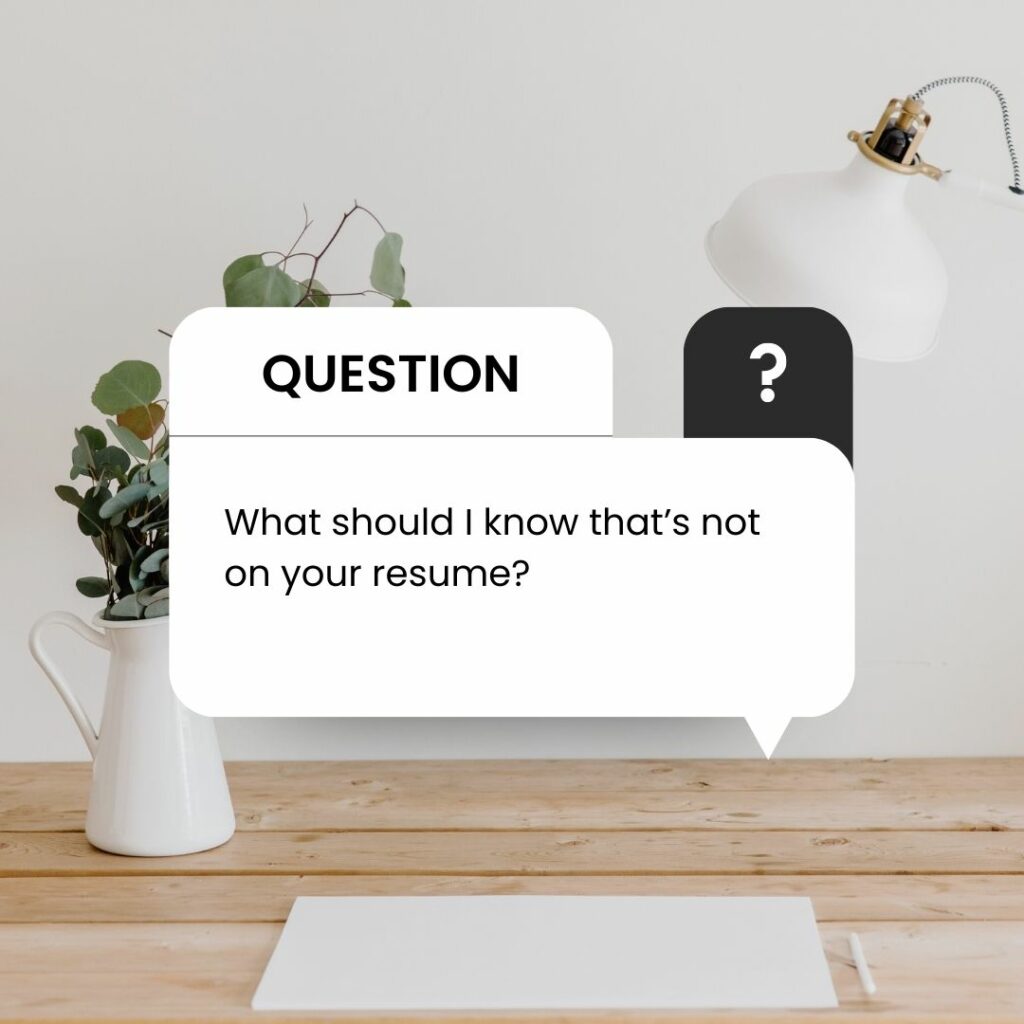How to answer: What should I know that’s not on your resume?

When it comes to job interviews, there’s always that one question that catches candidates off guard. It’s the question that goes beyond the surface-level information provided on your resume. Employers want to know what sets you apart from other applicants, what unique skills or experiences you bring to the table. So, what should you know that’s not on your resume?
While your resume may highlight your educational background, work experience, and technical skills, it often fails to capture the intangible qualities that make you a valuable asset to a company. Employers are interested in learning about your problem-solving abilities, your ability to work well in a team, your adaptability, and your leadership potential. These are the qualities that can’t be easily quantified or listed on a piece of paper. So, when faced with the question of what’s not on your resume, take the opportunity to showcase your personality, your passion for the industry, and your ability to think critically.

How to Answer a Question: What should I know that’s not on your resume?
There are actually several ways to approach this question, but let me break it down for you. First, let’s talk about why interviewers ask it and what a typical answer might be. Then, I’ll share with you what the ideal response should be, as well as what makes a good or even a great answer.
And of course, I’ll throw in an extra tip to help you absolutely nail this question. Sound good? Let’s dive in!
Why did the interviewer ask this?
To get a more comprehensive view of your background, experiences, and to uncover potential hidden gems or red flags.
Typical Answer
I’ve volunteered at a few places relevant to this job.
Wrong Answer
I’m a two-time champion in the underground arm wrestling league.
Good Answer
Highlight experiences, projects, or personal traits that are relevant to the job but didn’t make it to the resume.
Great Answer
While my resume highlights my professional journey, it doesn’t capture my [specific trait or experience], which I believe adds significant value to this role.
Last Tip on How to Answer What should I know that’s not on your resume?
Keep it relevant to the job or culture of the company.
If you’re into this tip, you can download 121 Interview Questions and Answers for free! It’s a great way to get more insights on how to answer those common questions in the best way possible.
Practice Your Answers in a Mock Job Interview
Answering this question is a breeze if you know how! But what really counts is practice. The best way to do that? Give mock interviews a shot! You can learn more about mock interviews here, or try out this Free Mini-Interview.
Final Thoughts on the Question: What should I know that’s not on your resume?
In a world where resumes are often the first impression we make, it’s easy to forget that there is so much more to a person than what can be captured on a single sheet of paper. So, when faced with the question, “What should I know that’s not on your resume?” it’s important to remember that this is your chance to truly shine and showcase your unique qualities. By following these tips, you will not only be able to answer this question with confidence, but also leave a lasting impression on the interviewer.
First and foremost, be authentic. This question is an opportunity for you to share something about yourself that sets you apart from other candidates. Whether it’s a personal passion, a life experience, or a skill that you possess, don’t be afraid to let your true self shine through. Remember, the interviewer is not just looking for a list of accomplishments, but rather a glimpse into who you are as a person.
As you conclude this page, remember that answering the question, “What should I know that’s not on your resume?” is your chance to leave a lasting impression. Embrace this opportunity to showcase your unique qualities, passions, and experiences. By being authentic, confident, and genuine in your response, you will not only answer the question effectively but also inspire the interviewer to see the value you can bring beyond what is written on a piece of paper. So go ahead, seize this moment and let your true self shine.

Jan Tegze, author of the bestseller “Full Stack Recruiter” and “Job Search Guide: Be Your Own Career Coach,” has over 15+ years of invaluable experience. Jan’s extensive background in full life cycle recruiting and profound understanding of international sourcing, recruitment branding, marketing, and pioneering sourcing techniques.